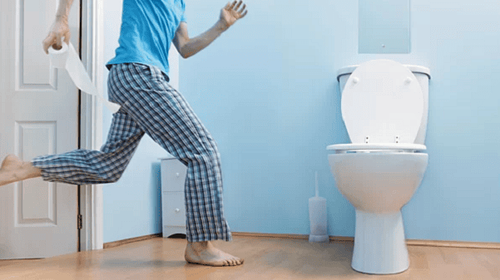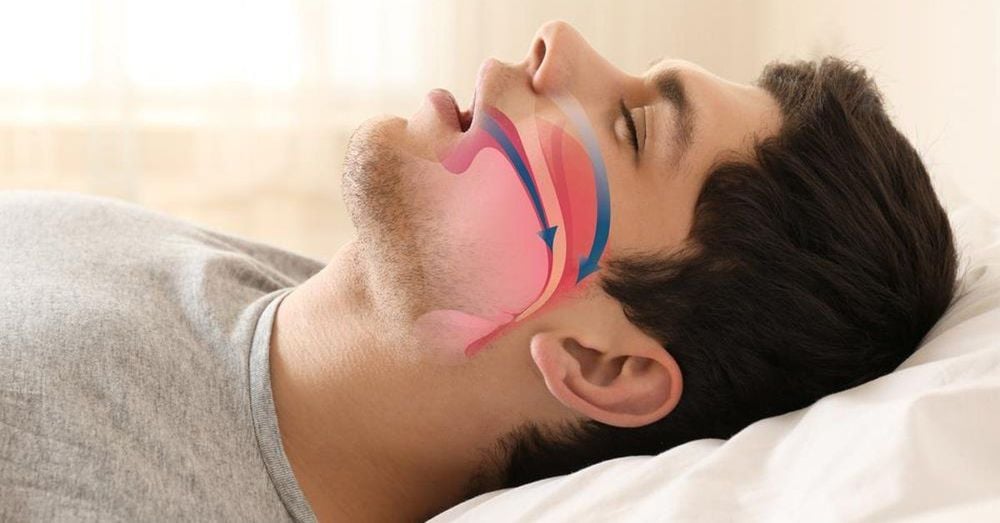This is an automatically translated article.
Waking up in the middle of the night can be very frustrating, especially if it happens often. Getting enough sleep is very important for your health. When sleep is disturbed, it takes a while for your body to return to deep sleep, which can keep you awake the next day.1. What causes you to wake up in the middle of the night?
Most people wake up once or twice during the night. This can happen for a number of reasons, including drinking caffeine or alcohol late in the day, a poor sleep environment, a sleep disorder, or another health condition.When you can't get back to sleep quickly, you won't get the quality sleep you need to stay refreshed and healthy. It's important to figure out what's waking you up so you can treat the problem and get a good night's sleep.
In general, adults need about 7 to 9 hours of sleep per night for the best health and spirit. Sleep is divided into light, deep, and rapid eye movement (REM) sleep. You cycle through these stages several times each night. Most of your deep sleep happens early at night. In the morning, you are mostly in a REM state and sleep is more shallow, when you are easily awakened by something.
1.1. Health causes that keep you awake in the middle of the night Many health conditions have symptoms that seem worse at night, such as:
Pain: Especially due to arthritis, heart failure, red blood cell anemia sickle or cancer. Tell your doctor if you are in so much pain that you cannot sleep. They may need to change your medication. Shortness of breath: Due to bronchitis, asthma or another lung disease. Digestive problems: Especially pain and cough caused by acid reflux or symptoms of irritable bowel syndrome. Hormones: Women often wake up at night when hormone levels change around their menstrual period or during menopause. Hot flashes and night sweats also disrupt sleep. Brain and neurological diseases: Including Alzheimer's and Parkinson's. Frequent urination: It can be because you drink a lot of fluids during the day or because of a health condition like diabetes, heart disease, or cystitis.

Nhiều tình trạng sức khỏe có các triệu chứng có vẻ tồi tệ hơn vào ban đêm như đi tiểu nhiều
Beta-blockers Antidepressants ADHD medications Decongestants Steroidal breathing treatments. If health problems often disrupt your sleep, let your doctor know. That could mean you need to start treatment or change what you're doing to manage your symptoms.
1.2. Psychological causes of waking up in the middle of the night Stress is one of the main reasons people wake up at night. It makes your sleep more shallow and prevents you from going into deep sleep and REM sleep.
Other mental health problems can also cause sleep problems, including:
Anxiety disorders such as post-traumatic stress disorder (PTSD) Bipolar disorder Depression Depression Schizophrenia If a mental health condition is keeping you from falling asleep or waking up, seek help from your doctor or mental health professional.
1.3. Your sleeping habits keep you awake in the middle of the night Some things you do every day can keep you from sleeping well at night.
Your sleep schedule: Changing the times you go to bed and wake up makes it difficult to keep your body clock working correctly. Electronic devices: Light from phones and computers can wake your brain. Alcohol: A drink before bed can make you fall asleep quickly, but you'll wake up at night as it dries up. And it doesn't allow you to enter deep sleep or REM sleep. Caffeine: It's a stimulant that can take up to 8 hours to wear off. Smoking: Nicotine is another stimulant that can keep you from getting a good night's sleep. Many smokers wake up too early when the body begins to crave cigarettes.

Một ly rượu trước khi ngủ có thể khiến bạn nhanh chóng chìm vào giấc ngủ, nhưng bạn sẽ thức giấc vào ban đêm khi nó cạn dần
Put shadows on the windows or wear an eye mask to block out light. Use earplugs, a fan, or a white noise machine to block out sounds. Keep the bedroom temperature cool. 1.5. Disturbed sleep rhythms keep you awake in the middle of the night Your body has a natural cycle of sleepiness and wakefulness. Your hormones and light control it. When sleep rhythm regulation is disturbed, you will have difficulty falling asleep. Causes of disturbed sleep rhythms include:
Age: your body's sleep rhythm changes as you age. You feel tired earlier in the evening and wake up earlier in the morning. You also spend more time in light sleep stages and less time in REM and deep sleep stages. Working nights or rotating shifts There's not much you can do to change some of these issues. Focus on the things you can control, like your day and night habits and any health conditions that need treatment.
1.6. Sleep disorders that make you restless or awake Other types of sleep problems can affect your ability to stay asleep, such as:
Sleep apnea: If you snore loudly and Frequently, you can develop obstructive sleep apnea. The tissues in the mouth and throat close the airway, causing you to stop breathing several times during the night. Your brain wakes you up enough that you can breathe again and you can regain consciousness completely. One of the most effective treatments is sleeping on a ventilator to keep your airways open. Restless limbs syndrome: This causes a tingling or prickling sensation that makes you want to stretch or move your leg. This condition may get worse at night. Periodic limb movement disorder (PLMD): Many people with restless legs also wake up in the middle of the night. Your limbs jerk and that wakes you up. Night terrors: These are episodes where you suddenly scream, pound, or appear scared while sleeping. They are most common in children, but adults can also get them.

Chứng ngưng thở khi ngủ có thể là nguyên nhân khiến bạn thường bị thức giấc giữa đêm
2. How not to wake up in the middle of the night?
Waking up in the middle of the night is a pretty common problem. Waking up in the middle of the night often occurs during periods of stress. Over-the-counter sleep aids rarely provide significant or lasting help with this problem.To help sleep soundly through the night, try some of these strategies to reduce mid-night awakenings:
Establish a habit of going to bed in a state of relaxation and tranquility: For example, drink a cup of caffeine-free tea, Take a warm bath or listen to soft music. Avoid prolonged use of electronic devices with screens, such as laptops, smartphones, and e-books, before bedtime. Relax your body: Gentle yoga or muscle relaxation can ease tension and relax your muscles, which will help you sleep better. Make your bedroom conducive to sleep: Keep light, noise, and temperature at a comfortable level that won't disturb your rest. Do not engage in activities other than sleeping or having sex in your bedroom. This will help your body know this is the place to sleep. Place the clock in an out of sight location in your bedroom: Watching the clock is stressful and makes it difficult to fall back to sleep if you wake up at night. Avoid caffeine after noon and limit alcohol to a few hours before bedtime: Both caffeine and alcohol can interfere with your sleep. Avoid Smoking: In addition to smoking being a major health risk, nicotine use can interfere with your sleep. Exercise regularly: But remember, exercising too close to bedtime can backfire, interfering with your sleep. Go to bed only when you're sleepy: If you're not drowsy before bed, do something relaxing that will help clear your mind. Wake up at the same time every day: If you feel an increased amount of time awake during the night, fight the urge to sleep. Avoid sleeping a lot during the day: Napping a lot can throw off your sleep cycle, making it harder for you to get a good night's sleep. If you wake up and can't fall back asleep within 20 minutes or so, get out of bed. Go to another room and read or do other quiet activities until you feel drowsy. Resist the urge to grab your phone while you try to get back to sleep.

Bạn nên tránh sử dụng caffein sau buổi trưa và hạn chế uống rượu 1 vài giờ trước khi đi ngủ
If you continue to have problems sleeping talk to your doctor, to determine the cause and best treatment for your insomnia you may need to see a sleep specialist . Your doctor may prescribe medication and ask you to try other strategies to get your sleep back on track. Depending on the cause of your insomnia, your doctor may refer you to a mental health professional, who can help in some cases.
If you have a need for consultation and examination at Vinmec Hospitals under the nationwide health system, please book an appointment on the website for service.
Please dial HOTLINE for more information or register for an appointment HERE. Download MyVinmec app to make appointments faster and to manage your bookings easily.
References: webmd.com, mayoclinic.org, healthline.com












